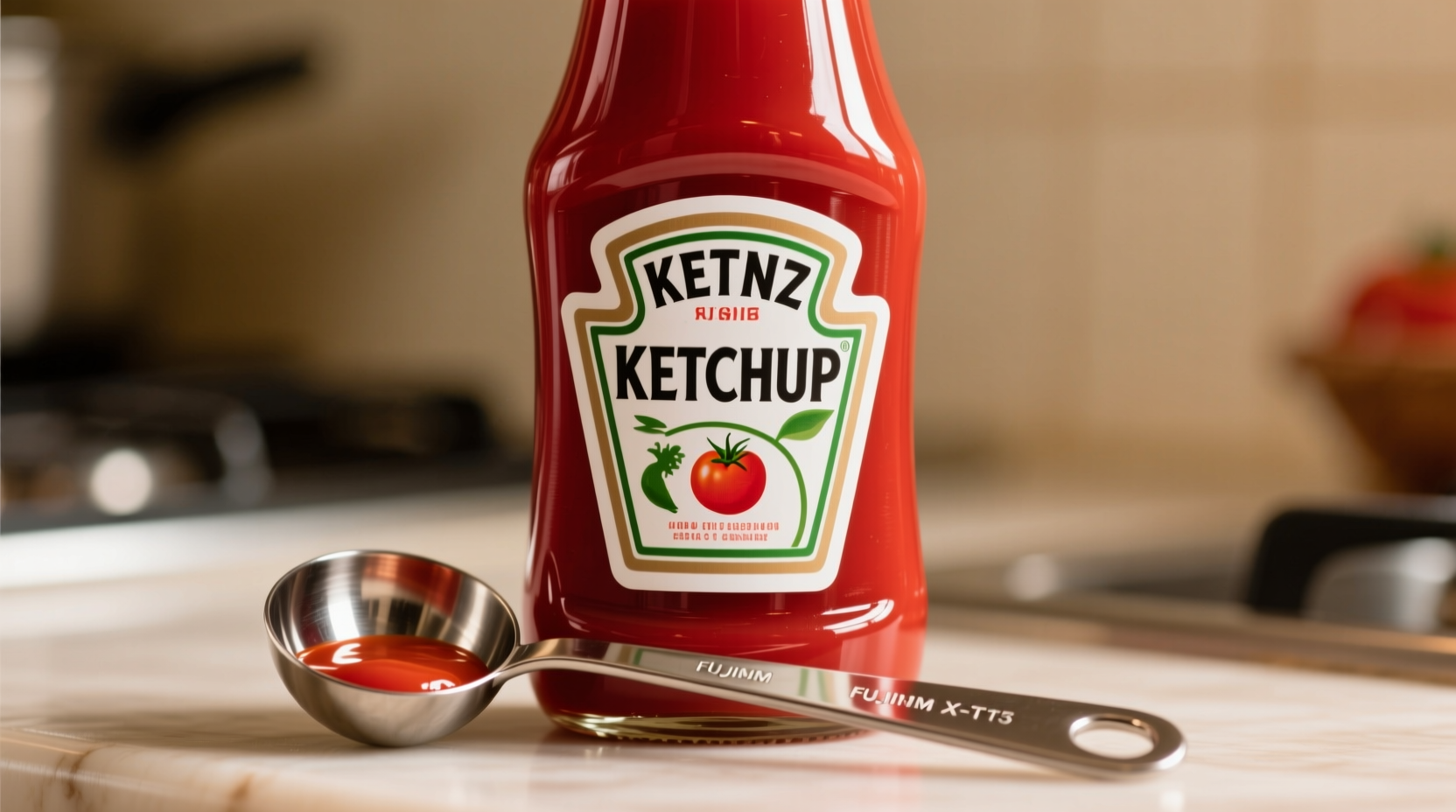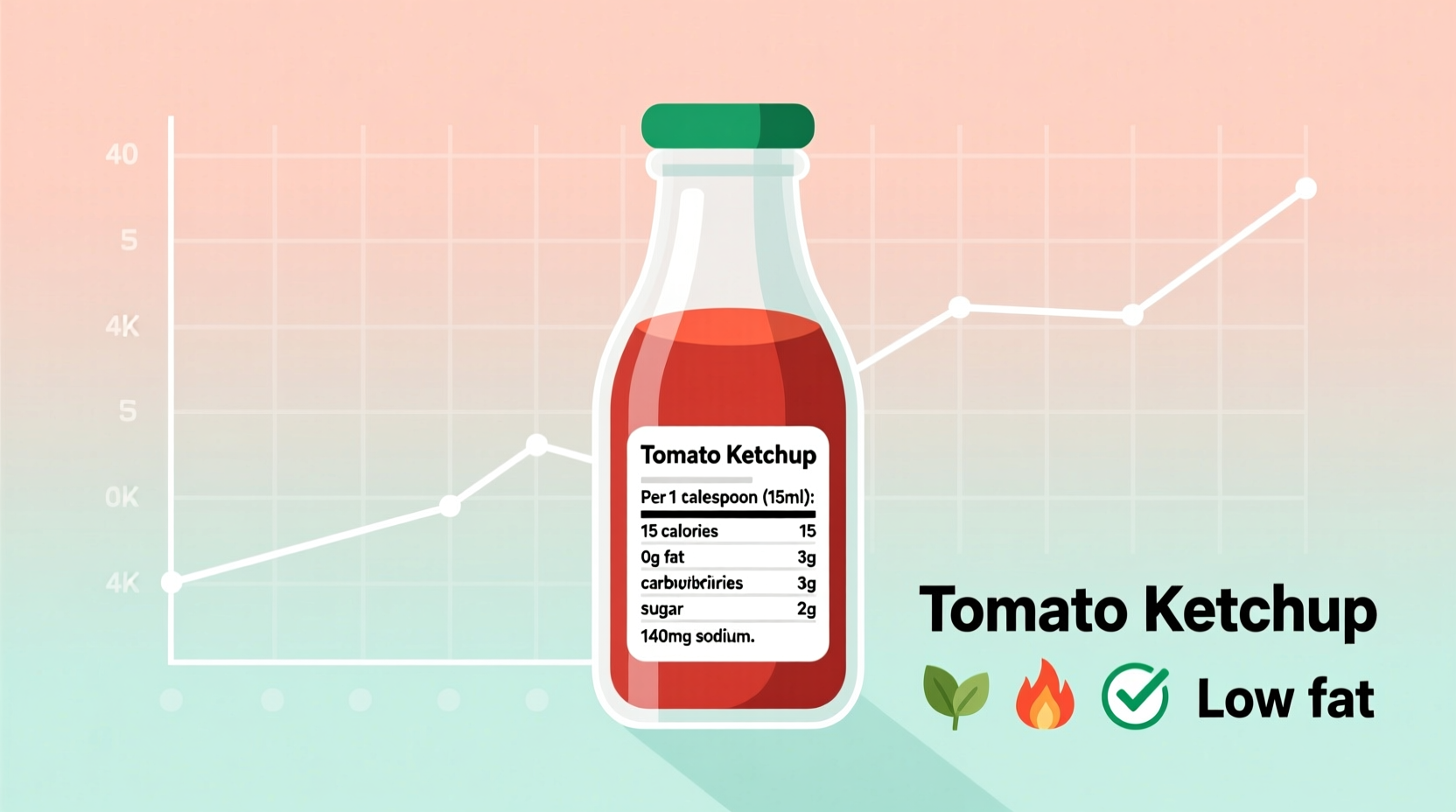Understanding exactly how many calories are in tomato ketchup matters more than you might think. Whether you're tracking macros, managing diabetes, or simply making informed dietary choices, knowing the precise nutritional content of common condiments helps you maintain control over your daily intake without sacrificing flavor.
Breaking Down Ketchup Nutrition Facts
When examining how many calories in tomato ketchup per tablespoon, it's essential to consider standard serving sizes. Most nutrition labels and databases use 17 grams (1 tablespoon) as the reference amount. According to the USDA's National Nutrient Database:
| Nutrient | Amount per Tablespoon (17g) | % Daily Value* |
|---|---|---|
| Calories | 15-20 | <1% |
| Total Carbohydrates | 4g | 1% |
| Sugars | 3-4g | - |
| Sodium | 150-190mg | 7% |
| Vitamin C | 2-3mg | 3% |
*Percent Daily Values are based on a 2,000 calorie diet. Your daily values may be higher or lower depending on your calorie needs.
This tomato ketchup calorie count breakdown reveals why portion control matters. While a single serving seems insignificant, multiple servings throughout a meal (common when dipping fries or using on burgers) can add up quickly. Many people unknowingly consume 2-3 tablespoons at a time, potentially adding 45-60 calories and 9-12 grams of sugar to their meal.
How Ketchup Compares to Other Condiments
When evaluating calories in tomato ketchup versus other popular condiments, the differences might surprise you. Understanding these comparisons helps make informed choices based on your dietary goals:
| Condiment (1 tbsp) | Calories | Sugar (g) | Sodium (mg) |
|---|---|---|---|
| Tomato Ketchup | 15-20 | 3-4 | 150-190 |
| Mustard | 3-5 | 0-1 | 50-120 |
| Mayonnaise | 90-100 | 0 | 90-120 |
| Barbecue Sauce | 45-55 | 11-13 | 150-200 |
| Hot Sauce | 0-5 | 0-1 | 100-200 |
This condiment nutrition comparison chart comes from aggregated data in the USDA FoodData Central database (accessed September 2025), providing reliable information for consumers tracking their dietary intake. While ketchup sits in the middle range for calories among common condiments, its sugar content is notably higher than mustard or hot sauce.
When Ketchup Calories Actually Matter
Understanding the practical impact of tomato ketchup calories in daily diet requires context. For most adults following a standard 2,000-calorie diet, a single tablespoon of ketchup represents less than 1% of daily needs. However, certain situations make these calories more significant:
- Strict calorie counters: Those on very low-calorie diets (1,200-1,500 calories) should account for every calorie
- Sugar-conscious consumers: The 3-4g of sugar per tablespoon adds up quickly for those managing diabetes
- Multiple serving scenarios: Using 3-4 tablespoons on fries or burgers adds 45-80 calories and 9-16g sugar
- Children's portions: Kids often use more ketchup relative to their smaller meal sizes
According to the American Heart Association, the recommended daily limit for added sugars is 25g for women and 36g for men. Just three tablespoons of ketchup would account for about one-third of a woman's daily added sugar limit.

Healthier Ketchup Options and Alternatives
If you're concerned about how many calories are in tomato ketchup but don't want to sacrifice flavor, consider these practical alternatives:
Lower-Calorie Ketchup Varieties
- "No Sugar Added" versions: Typically 5-10 calories per tablespoon with artificial sweeteners
- Organic ketchups: Often use less sugar but similar calorie counts (15-20 calories)
- Reduced-sodium options: Same calories but 25-30% less sodium
Nutritionally Superior Alternatives
- Mustard: Only 3-5 calories per tablespoon with virtually no sugar
- Salsa: About 5-10 calories per tablespoon with added vegetables
- Hot sauce: Typically 0-5 calories with no sugar and potential metabolism benefits
- Tomato paste + vinegar: Make your own lower-sugar version (about 10 calories)
Practical Tips for Managing Ketchup Consumption
Instead of eliminating ketchup completely, use these evidence-based strategies to enjoy it while maintaining your nutritional goals:
- Measure your servings: Use an actual measuring spoon instead of guessing
- Try the "half-squeeze" technique: Squeeze half the usual amount and see if it satisfies your taste
- Pair with high-volume foods: Use ketchup on foods with high water content (like grilled vegetables) to spread flavor further
- Create flavor layers: Mix a small amount of ketchup with mustard for more complex flavor with fewer calories
- Check restaurant portions: Restaurant servings often contain 2-3 tablespoons (30-60 calories)
Research from the USDA Food and Nutrition Information Center shows that small modifications to condiment use can save 100-200 calories daily without significantly impacting meal satisfaction.
Reading Ketchup Nutrition Labels Effectively
When determining exactly how many calories in tomato ketchup for your specific brand, follow these label-reading tips:
- Check the serving size first - some brands list nutrition for 5g (less than 1 tsp) to make numbers appear lower
- Compare "total sugars" versus "added sugars" - some brands use fruit juice concentrates
- Look for "no high fructose corn syrup" claims if reducing processed sugars
- Consider organic versus conventional - nutritional differences are minimal but ingredient quality varies
- Check for hidden ingredients like onion powder or garlic powder that add flavor without calories
Remember that homemade ketchup calorie count can be controlled by adjusting sugar content. A simple recipe using tomato paste, vinegar, and a small amount of sweetener can reduce calories to 10-15 per tablespoon while maintaining flavor.
Frequently Asked Questions
How many calories are in a packet of ketchup?
A standard ketchup packet (about 9 grams) contains approximately 8-10 calories. Most restaurant packets contain roughly half a tablespoon of ketchup, making them a lower-calorie option than bottled ketchup when used in standard portions.
Is ketchup high in sugar compared to other condiments?
Yes, ketchup contains about 3-4 grams of sugar per tablespoon, which is higher than mustard (0-1g) or hot sauce (0-1g), but lower than barbecue sauce (11-13g). This makes ketchup moderately high in sugar among common condiments, which is important to consider for those monitoring sugar intake.
Does sugar-free ketchup have fewer calories?
Yes, sugar-free ketchup typically contains 5-10 calories per tablespoon compared to 15-20 in regular ketchup. The reduction comes from replacing sugar with artificial sweeteners like sucralose or stevia, which provide sweetness with minimal calories.
Can ketchup fit into a weight loss diet?
Yes, ketchup can fit into a weight loss diet when used in moderation. One tablespoon (15-20 calories) won't significantly impact most calorie-controlled diets. For better results, measure portions, consider lower-sugar varieties, or mix with mustard to stretch flavor while reducing calories.
How does homemade ketchup compare nutritionally to store-bought?
Homemade ketchup typically contains fewer calories (10-15 per tablespoon) and less sugar than store-bought versions when made with controlled sweeteners. You can adjust ingredients to reduce sugar by 25-50% while maintaining flavor through vinegar and spice adjustments, giving you more control over the nutritional profile.











 浙公网安备
33010002000092号
浙公网安备
33010002000092号 浙B2-20120091-4
浙B2-20120091-4